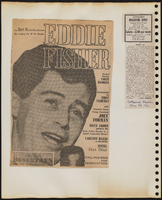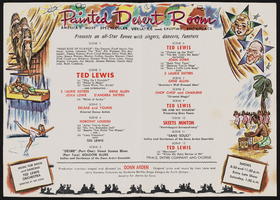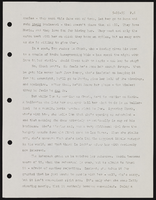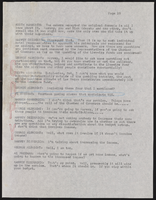Search the Special Collections and Archives Portal
Search Results

Transcript of interview with Elinor Horden by Valerie Fujii, February 13, 1930
Date
Archival Collection
Description
On February 13th, 1980, collector Valerie Fujii interviewed dancer, Elinor Horden, (born May 21st, 1930 in Ohio) at the University of Nevada, Las Vegas. This interview covers local entertainment in the 1950s and the social and environmental changes that have occurred in Las Vegas, Nevada.
Text
Bill Armstrong oral history interview
Identifier
Abstract
Oral history interview with Bill Armstrong conducted by Anthony Robone on February 20, 1979 for the Ralph Roske Oral History Project on Early Las Vegas. In the interview, Armstrong discusses his time bootlegging in Kentucky before arriving in Las Vegas, Nevada, his involvement with the Las Vegas dealers, and the weather as it relates to other parts of the country. He also discusses the impacts of the work of Howard Hughes on the town, the construction of Hoover Dam, the above-ground atomic testing, the growth of Las Vegas and tourism, changes in gambling habits for the next generation, and the social and recreational activities of residents.
Archival Collection
Myrtle Banks oral history interview
Identifier
Abstract
Oral history interview with Myrtle Banks conducted by George Williams on March 15, 1981 for the Ralph Roske Oral History Project on Early Las Vegas. Banks discusses African American history in Nevada, specifically in the context of job opportunities, relationships with whites, and the social and political changes that took place over time. Banks also discusses the riots of the 1960s, changes in crime rates and their effect on the perception of safety. Lastly she discusses growth in the construction industry and population, inflation, and how gambling and entertainment define Las Vegas, Nevada.
Archival Collection
"The Man Who Broke the Bank of Monte Carlo" by Fred Gilbert, 1935
Level of Description
Archival Collection
Collection Name: UNLV Libraries Collection of Gambling Related Sheet Music
Box/Folder: Oversized Box 02
Archival Component
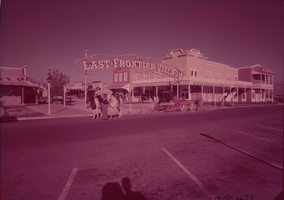
Film transparency of people and horses at the entrance to the Last Frontier Village (Las Vegas), circa 1950s
Date
Archival Collection
Description
People, horses and carriages in front of the Last Frontier Village entrance. The Silver Slipper Gambling Hall, without its neon signs, is seen in the foreground.
Site Name: Frontier
Address: 3120 Las Vegas Boulevard South
Image

